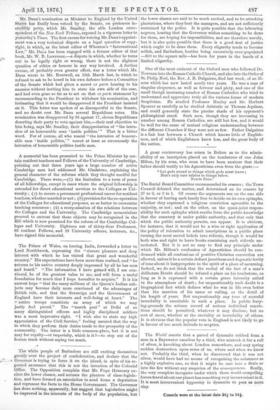A great controversy has arisen in Bolton as to the
admis- sibility of an inscription placed on the tombstone of one John Hilton, by his sons, who seem to have been anxious that their father should testify to his Agnosticism even from the grave :— 14 Let gods attend to things which gods must know; Man's only care relates to things below. Nescio Deos."
The Burial Board Committee recommended its erasure ; the Town Council debated the matter, and determined on its erasure by 27 to 9, or 3 to 1. Of course the arguments ran on the one side in favour of leaving each family free to decide on its own epitaphs, whether they expressed a religious conviction agreeable to the majority, or not ; and on the other, on the quasi-joint respon- sibility for such epitaphs which results from the public knowledge that the cemetery is under public authority, and that only that which the public authority permits, can appear. It is obvious, for instance, that it would not be a wise or right application of the policy of toleration to admit inscriptions in a public place turning the most sacred beliefs into ridicule, though it would be both wise and right to leave books containing such ridicule un- molested. But it is not so easy to find any principle under which Mr. Hilton's confession of Agnosticism should be con- demned while all confessions of positive Christian conviction are allowed, unless it be a certain defiant jauntiness and dogmatic levity of tone about it inappropriate to the spirit of a place of mourning. Indeed, we do not think that the recital of the fact of a man's deliberate Doubt should be refused a place on his tombstone, so long as it is expressed with a certain grave intensity suited to the atmosphere of death ; for unquestionably such doubt is a biographical fact which defines what he was in life even better than the mention of his name or calling, or the detail of his length of years. But unquestionably any tone of scornful incredulity is unsuitable in such a place. In public bury- ing-grounds the solemn record of serious individual convic- tions should be permitted, whatever it may disclose, but no sort of sneer, whether at the credulity or incredulity of others. It is obvious that the popular vote in England is not likely to go in favour of too much latitude to sceptics.


































 Previous page
Previous page